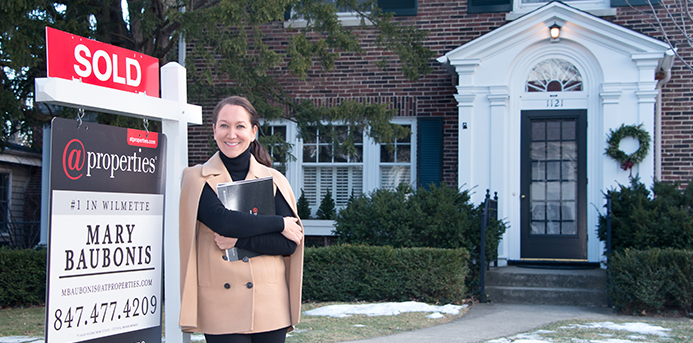Mary Baubonis’ friend was in need of a realtor to help sell her home. Baubonis, a Wilmette resident, was the perfect person to ask for help — as a North Shore broker, she had been selling residential real estate for more than 20 years. There was, however, just one teensy problem: Her friend lived in another state, far from the hyperlocal expertise of Baubonis.
While Baubonis couldn’t sell her friend’s home, she gave her a list of questions to help vet prospective agents. “Oftentimes what [homeowners] do is call a company and say, ‘who’s your top producer?’ But there’s so much more to it than that.”
Asking questions is the best place to start when choosing a realtor. Buying or selling a home is a risky proposition, compounded by the unknown. Not only are you entrusting a stranger to help you maneuver through one of the biggest financial decisions you will ever make, but you will also be working closely with that person for months, sometimes even years.
For Frank Capitanini, a Coldwell Banker Residential Brokerage real estate agent serving Winnetka and the North Shore, real estate is a business of relationships. It once took his team seven years to find the perfect home for a client; the one after that took five years. “You explain to them that it’s a relationship and not a transaction,” says Capitanini. “That’s what we’ve said from day one.”
One of the best ways to gauge a real estate agent’s character before meeting them is to ask for references or to read about their track record online. Or ask family and friends for referrals, which is how Jean Wright, owner of her 33-year-old eponymous boutique real estate company, says she gets most of her business.
Says Wright, “You want to pick someone [who] has a good track record.”
That means an agent who doesn’t cut corners. One who is going to take the time to stage your house. One who will personally give tours to prospective buyers and not just leave the keys in a lockbox.
Look for someone who is deeply familiar with the location, whether you’re buying or selling. “You’re not going to pick a Hinsdale broker to represent you in Wilmette,” says Capitanini. “It’s important that you work with someone who lives in the community, knows … everything about it.”
If you’re looking to purchase an apartment in Chicago, for example, the agent should be familiar with not just one or two neighborhoods but many different ones, according to Rick Sobin, managing broker and vice president of brokerage services with @properties. If a certain price point isn’t available in a desired area, a knowledgeable agent can guide a client just a few miles away to listings in a “sister neighborhood.”
For sellers, how their broker will market their home is incredibly important.
“One of the first things you should ask a prospective broker is ‘What will you do for me to help maximize the exposure of my home?’” Baubonis says. Ask them for a detailed marketing plan: “What will you do once you get the listing?”
In the end, communication is key. For Chris Downey, of KoenigRubloff Realty Group, the connection between the buyer (or the seller) and the agent is the most important thing.
As is a solid work ethic. Jean Wright answered my call on her birthday.
“A good broker is available almost 24 hours a day,” Wright says.
More from Make It Better:

